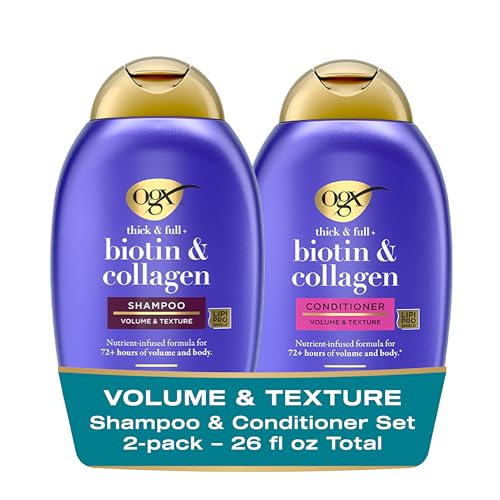It’s not a secret that people are more conscious of their health and appearance than ever before, and thus, biotin and collagen shampoos have grown quite popular. The products that target the hair claim to help in making hair stronger, grow, and become healthier. Still, the lit question that remains to be answered is whether the biotin and collagen shampoo is good for hair. As such, this article seeks to explore the provenance of these ingredients, their mode of operation in shampoos, and their effectiveness or otherwise for hair.
Understanding Biotin and Collagen
- VOLUME & TEXTURE: The 25.4-fluid ounce bottle of OGX Thick & Full + Biotin & Collagen Volumizing Shampoo with a nutrient…
- HEALTHY HAIR IN JUST 1 WASH: Our new & improved formula protects hair from excessive loss of lipids & proteins which cre…
- POWERED BY SCIENCE: LipiPro Shield (TM) Technology gives 2x more protein & lipid protection** & supports hair’s protein …
What Is Biotin?
Biotin, also known as Vitamin B7, is a water-soluble vitamin essential for various metabolic processes, including the production of keratin—the primary protein that makes up hair, skin, and nails. Adequate biotin levels are crucial for maintaining healthy hair.
What Is Collagen?
Collagen is widely known as the protein that lends support to the skin, hair, nails, and many other connective tissues – yet the body’s most common protein! It has an involvement in the making of hair strands and the mass of the hair as well as reducing hair breakages.
How Do Biotin and Collagen Shampoos Work?
These shampoos deposit collagen and biotin to the scalp and hair follicles or the shaft.. The aim is to strengthen hair shafts, improve water retention in hair, and also improve texture and look of hair.
Topical Application Benefits of Biotin and Collagen
While both biotin and collagen are more effective when ingested, topical application may offer surface-level benefits. These shampoos often include additional nourishing ingredients like vitamins, oils, and amino acids that can condition the hair and scalp.
Potential Benefits of collagen and biotin
- Strengthening Hair Strands: Biotin and collagen may help reinforce the hair structure, making it less prone to damage.
- Enhancing Hair Thickness: Users often report that their hair feels thicker and looks fuller after regular use.
- Improving Hair Texture: These shampoos can add shine and smoothness, improving the overall feel of the hair.
Scientific Perspective
- Limited Absorption: The skin’s barrier function limits the absorption of large molecules like collagen through topical application.
- Lack of Clinical Evidence: There is limited scientific research supporting the effectiveness of biotin and collagen shampoos in promoting significant hair growth.
Expert Opinions
Hair care professionals suggest that while these shampoos can improve the appearance and texture of hair, they may not address underlying issues related to hair loss or thinning.
Dr. Emily Roberts, Trichologist: “Biotin and collagen shampoos can enhance hair’s look and feel due to their conditioning properties, but they shouldn’t be relied upon for treating hair loss or severe thinning.”
Considerations Before Using
- Manage Expectations: Understand that results may vary and are often cosmetic rather than therapeutic.
- Check for Allergens: Always review the ingredient list to avoid potential allergic reactions.
- Consult a Professional: If you’re experiencing significant hair issues, it’s best to seek advice from a healthcare provider or dermatologist.
Alternatives for Optimal Hair Health
- Balanced Diet: Incorporate foods rich in biotin and collagen, such as eggs, nuts, leafy greens, and bone broth.
- Oral Supplements: Under medical guidance, supplements can help address deficiencies.
- Healthy Hair Practices: Reduce heat styling, avoid harsh chemicals, and use gentle hair care products.
Thus, is biotin and collagen shampoo beneficial to hair? Such shampoos could be those which have other compounds that enhance the appearance and texture of hair. However, current scientific knowledge does not prove that they help much with hair growth or contribute to resolving hair health problems It’s better to treat them as a part of comprehensive management for hair and overall health and months any complications with your doctor.




